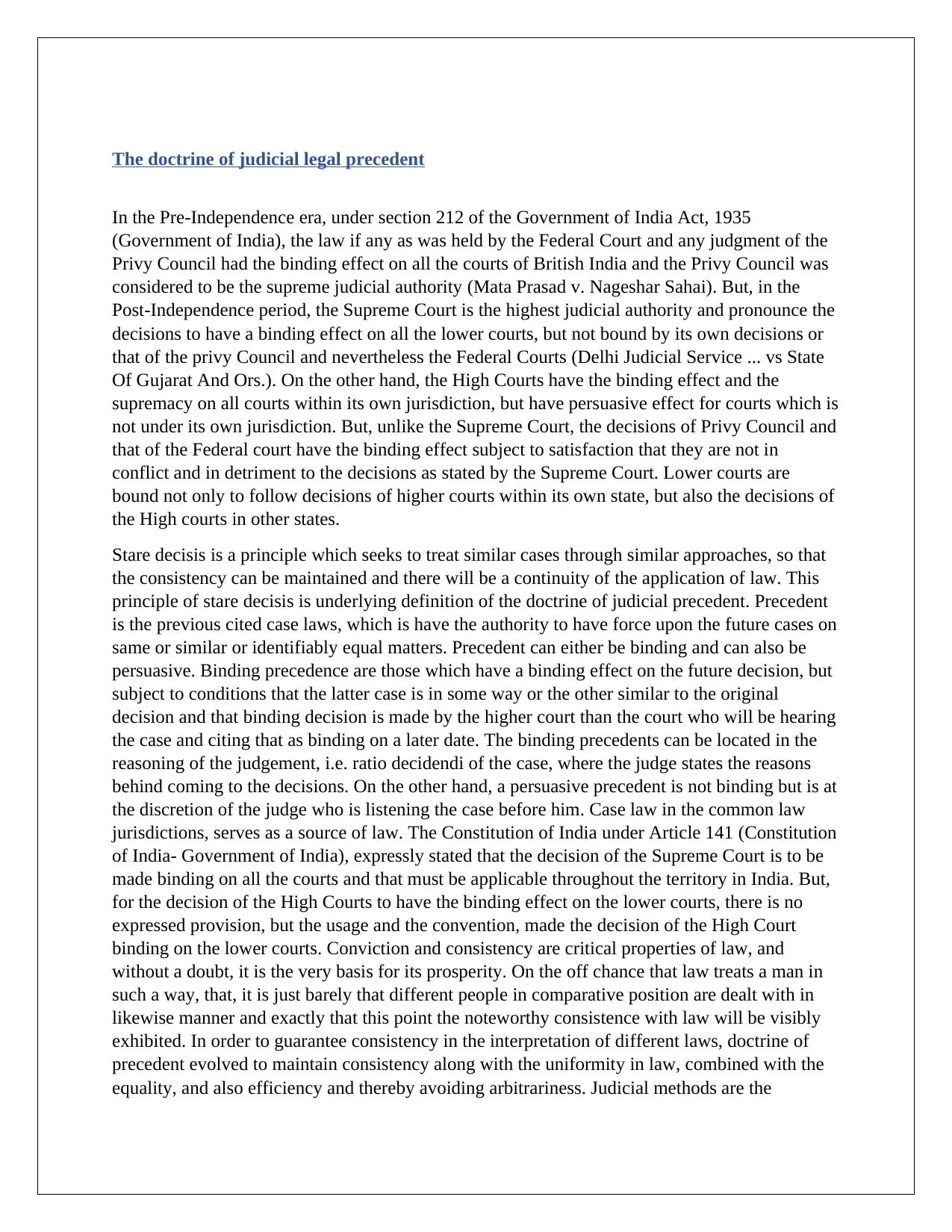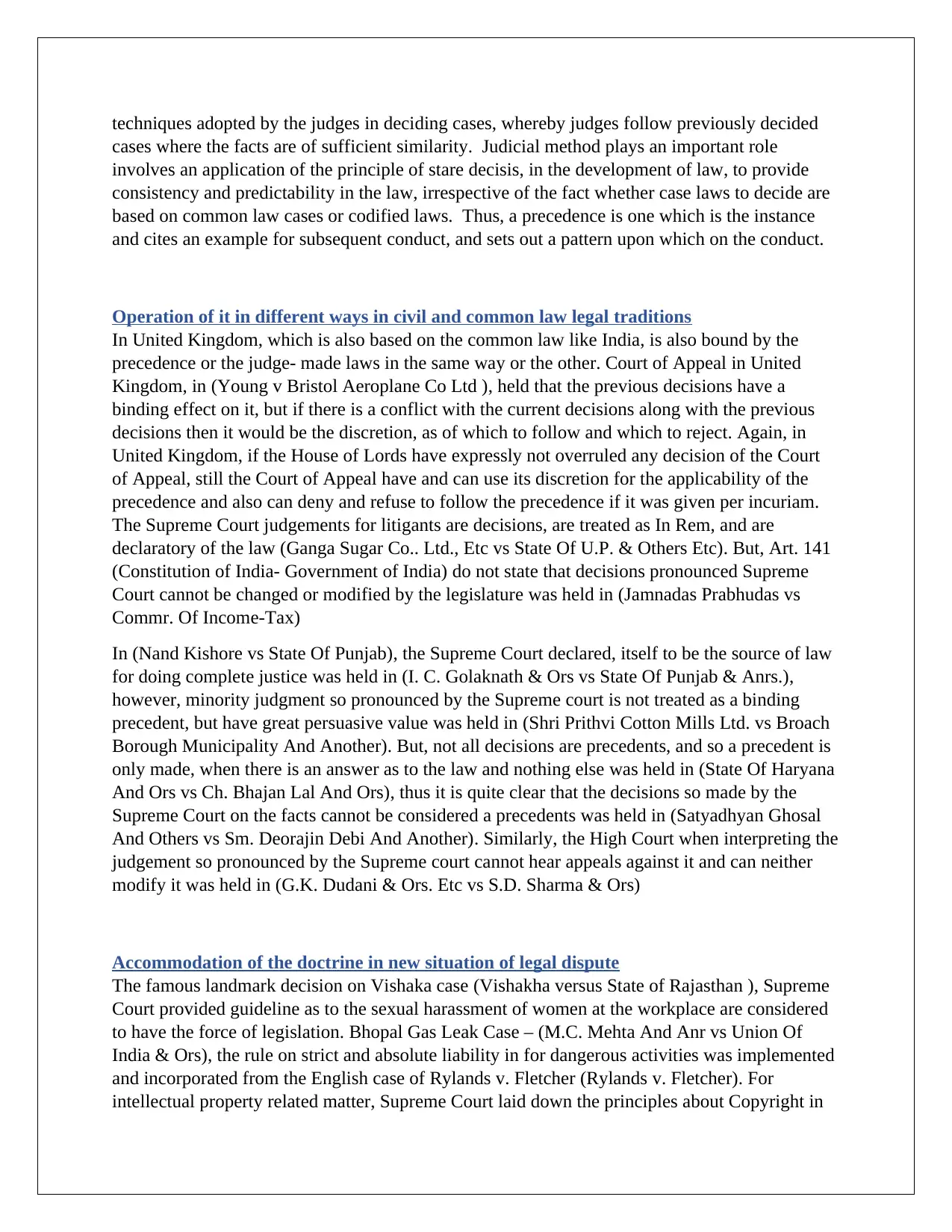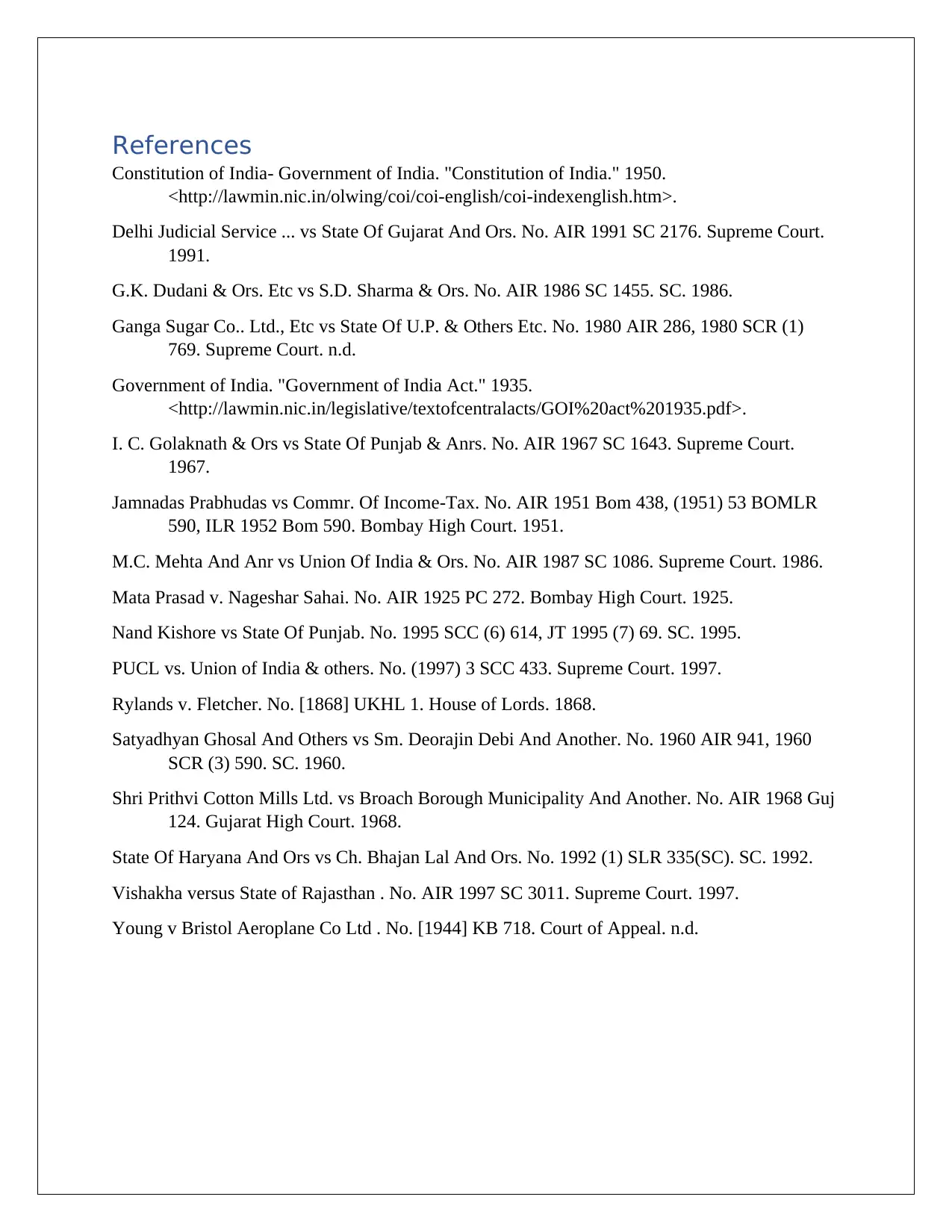Judicial Precedent: History, Application, and Significance in Law
VerifiedAdded on 2019/09/30
|4
|1786
|283
Essay
AI Summary
This essay examines the doctrine of judicial precedent, a fundamental principle in common law systems. It traces the evolution of the doctrine, highlighting the binding effect of decisions from higher courts on lower courts, and the persuasive influence of decisions from other jurisdictions. The essay explains the concepts of stare decisis, ratio decidendi, and the distinction between binding and persuasive precedents. It explores the roles of the Supreme Court and High Courts in India, referencing key constitutional provisions and landmark cases such as Vishaka versus State of Rajasthan and the Bhopal Gas Leak Case. The analysis covers the application of precedent in different legal traditions, including the United Kingdom, and discusses how the doctrine ensures consistency, uniformity, and predictability in the application of law, while also accommodating new situations of legal dispute. The essay concludes by emphasizing the importance of judicial methods in upholding the rule of law.

The doctrine of judicial legal precedent
In the Pre-Independence era, under section 212 of the Government of India Act, 1935
(Government of India), the law if any as was held by the Federal Court and any judgment of the
Privy Council had the binding effect on all the courts of British India and the Privy Council was
considered to be the supreme judicial authority (Mata Prasad v. Nageshar Sahai). But, in the
Post-Independence period, the Supreme Court is the highest judicial authority and pronounce the
decisions to have a binding effect on all the lower courts, but not bound by its own decisions or
that of the privy Council and nevertheless the Federal Courts (Delhi Judicial Service ... vs State
Of Gujarat And Ors.). On the other hand, the High Courts have the binding effect and the
supremacy on all courts within its own jurisdiction, but have persuasive effect for courts which is
not under its own jurisdiction. But, unlike the Supreme Court, the decisions of Privy Council and
that of the Federal court have the binding effect subject to satisfaction that they are not in
conflict and in detriment to the decisions as stated by the Supreme Court. Lower courts are
bound not only to follow decisions of higher courts within its own state, but also the decisions of
the High courts in other states.
Stare decisis is a principle which seeks to treat similar cases through similar approaches, so that
the consistency can be maintained and there will be a continuity of the application of law. This
principle of stare decisis is underlying definition of the doctrine of judicial precedent. Precedent
is the previous cited case laws, which is have the authority to have force upon the future cases on
same or similar or identifiably equal matters. Precedent can either be binding and can also be
persuasive. Binding precedence are those which have a binding effect on the future decision, but
subject to conditions that the latter case is in some way or the other similar to the original
decision and that binding decision is made by the higher court than the court who will be hearing
the case and citing that as binding on a later date. The binding precedents can be located in the
reasoning of the judgement, i.e. ratio decidendi of the case, where the judge states the reasons
behind coming to the decisions. On the other hand, a persuasive precedent is not binding but is at
the discretion of the judge who is listening the case before him. Case law in the common law
jurisdictions, serves as a source of law. The Constitution of India under Article 141 (Constitution
of India- Government of India), expressly stated that the decision of the Supreme Court is to be
made binding on all the courts and that must be applicable throughout the territory in India. But,
for the decision of the High Courts to have the binding effect on the lower courts, there is no
expressed provision, but the usage and the convention, made the decision of the High Court
binding on the lower courts. Conviction and consistency are critical properties of law, and
without a doubt, it is the very basis for its prosperity. On the off chance that law treats a man in
such a way, that, it is just barely that different people in comparative position are dealt with in
likewise manner and exactly that this point the noteworthy consistence with law will be visibly
exhibited. In order to guarantee consistency in the interpretation of different laws, doctrine of
precedent evolved to maintain consistency along with the uniformity in law, combined with the
equality, and also efficiency and thereby avoiding arbitrariness. Judicial methods are the
In the Pre-Independence era, under section 212 of the Government of India Act, 1935
(Government of India), the law if any as was held by the Federal Court and any judgment of the
Privy Council had the binding effect on all the courts of British India and the Privy Council was
considered to be the supreme judicial authority (Mata Prasad v. Nageshar Sahai). But, in the
Post-Independence period, the Supreme Court is the highest judicial authority and pronounce the
decisions to have a binding effect on all the lower courts, but not bound by its own decisions or
that of the privy Council and nevertheless the Federal Courts (Delhi Judicial Service ... vs State
Of Gujarat And Ors.). On the other hand, the High Courts have the binding effect and the
supremacy on all courts within its own jurisdiction, but have persuasive effect for courts which is
not under its own jurisdiction. But, unlike the Supreme Court, the decisions of Privy Council and
that of the Federal court have the binding effect subject to satisfaction that they are not in
conflict and in detriment to the decisions as stated by the Supreme Court. Lower courts are
bound not only to follow decisions of higher courts within its own state, but also the decisions of
the High courts in other states.
Stare decisis is a principle which seeks to treat similar cases through similar approaches, so that
the consistency can be maintained and there will be a continuity of the application of law. This
principle of stare decisis is underlying definition of the doctrine of judicial precedent. Precedent
is the previous cited case laws, which is have the authority to have force upon the future cases on
same or similar or identifiably equal matters. Precedent can either be binding and can also be
persuasive. Binding precedence are those which have a binding effect on the future decision, but
subject to conditions that the latter case is in some way or the other similar to the original
decision and that binding decision is made by the higher court than the court who will be hearing
the case and citing that as binding on a later date. The binding precedents can be located in the
reasoning of the judgement, i.e. ratio decidendi of the case, where the judge states the reasons
behind coming to the decisions. On the other hand, a persuasive precedent is not binding but is at
the discretion of the judge who is listening the case before him. Case law in the common law
jurisdictions, serves as a source of law. The Constitution of India under Article 141 (Constitution
of India- Government of India), expressly stated that the decision of the Supreme Court is to be
made binding on all the courts and that must be applicable throughout the territory in India. But,
for the decision of the High Courts to have the binding effect on the lower courts, there is no
expressed provision, but the usage and the convention, made the decision of the High Court
binding on the lower courts. Conviction and consistency are critical properties of law, and
without a doubt, it is the very basis for its prosperity. On the off chance that law treats a man in
such a way, that, it is just barely that different people in comparative position are dealt with in
likewise manner and exactly that this point the noteworthy consistence with law will be visibly
exhibited. In order to guarantee consistency in the interpretation of different laws, doctrine of
precedent evolved to maintain consistency along with the uniformity in law, combined with the
equality, and also efficiency and thereby avoiding arbitrariness. Judicial methods are the
Paraphrase This Document
Need a fresh take? Get an instant paraphrase of this document with our AI Paraphraser

techniques adopted by the judges in deciding cases, whereby judges follow previously decided
cases where the facts are of sufficient similarity. Judicial method plays an important role
involves an application of the principle of stare decisis, in the development of law, to provide
consistency and predictability in the law, irrespective of the fact whether case laws to decide are
based on common law cases or codified laws. Thus, a precedence is one which is the instance
and cites an example for subsequent conduct, and sets out a pattern upon which on the conduct.
Operation of it in different ways in civil and common law legal traditions
In United Kingdom, which is also based on the common law like India, is also bound by the
precedence or the judge- made laws in the same way or the other. Court of Appeal in United
Kingdom, in (Young v Bristol Aeroplane Co Ltd ), held that the previous decisions have a
binding effect on it, but if there is a conflict with the current decisions along with the previous
decisions then it would be the discretion, as of which to follow and which to reject. Again, in
United Kingdom, if the House of Lords have expressly not overruled any decision of the Court
of Appeal, still the Court of Appeal have and can use its discretion for the applicability of the
precedence and also can deny and refuse to follow the precedence if it was given per incuriam.
The Supreme Court judgements for litigants are decisions, are treated as In Rem, and are
declaratory of the law (Ganga Sugar Co.. Ltd., Etc vs State Of U.P. & Others Etc). But, Art. 141
(Constitution of India- Government of India) do not state that decisions pronounced Supreme
Court cannot be changed or modified by the legislature was held in (Jamnadas Prabhudas vs
Commr. Of Income-Tax)
In (Nand Kishore vs State Of Punjab), the Supreme Court declared, itself to be the source of law
for doing complete justice was held in (I. C. Golaknath & Ors vs State Of Punjab & Anrs.),
however, minority judgment so pronounced by the Supreme court is not treated as a binding
precedent, but have great persuasive value was held in (Shri Prithvi Cotton Mills Ltd. vs Broach
Borough Municipality And Another). But, not all decisions are precedents, and so a precedent is
only made, when there is an answer as to the law and nothing else was held in (State Of Haryana
And Ors vs Ch. Bhajan Lal And Ors), thus it is quite clear that the decisions so made by the
Supreme Court on the facts cannot be considered a precedents was held in (Satyadhyan Ghosal
And Others vs Sm. Deorajin Debi And Another). Similarly, the High Court when interpreting the
judgement so pronounced by the Supreme court cannot hear appeals against it and can neither
modify it was held in (G.K. Dudani & Ors. Etc vs S.D. Sharma & Ors)
Accommodation of the doctrine in new situation of legal dispute
The famous landmark decision on Vishaka case (Vishakha versus State of Rajasthan ), Supreme
Court provided guideline as to the sexual harassment of women at the workplace are considered
to have the force of legislation. Bhopal Gas Leak Case – (M.C. Mehta And Anr vs Union Of
India & Ors), the rule on strict and absolute liability in for dangerous activities was implemented
and incorporated from the English case of Rylands v. Fletcher (Rylands v. Fletcher). For
intellectual property related matter, Supreme Court laid down the principles about Copyright in
cases where the facts are of sufficient similarity. Judicial method plays an important role
involves an application of the principle of stare decisis, in the development of law, to provide
consistency and predictability in the law, irrespective of the fact whether case laws to decide are
based on common law cases or codified laws. Thus, a precedence is one which is the instance
and cites an example for subsequent conduct, and sets out a pattern upon which on the conduct.
Operation of it in different ways in civil and common law legal traditions
In United Kingdom, which is also based on the common law like India, is also bound by the
precedence or the judge- made laws in the same way or the other. Court of Appeal in United
Kingdom, in (Young v Bristol Aeroplane Co Ltd ), held that the previous decisions have a
binding effect on it, but if there is a conflict with the current decisions along with the previous
decisions then it would be the discretion, as of which to follow and which to reject. Again, in
United Kingdom, if the House of Lords have expressly not overruled any decision of the Court
of Appeal, still the Court of Appeal have and can use its discretion for the applicability of the
precedence and also can deny and refuse to follow the precedence if it was given per incuriam.
The Supreme Court judgements for litigants are decisions, are treated as In Rem, and are
declaratory of the law (Ganga Sugar Co.. Ltd., Etc vs State Of U.P. & Others Etc). But, Art. 141
(Constitution of India- Government of India) do not state that decisions pronounced Supreme
Court cannot be changed or modified by the legislature was held in (Jamnadas Prabhudas vs
Commr. Of Income-Tax)
In (Nand Kishore vs State Of Punjab), the Supreme Court declared, itself to be the source of law
for doing complete justice was held in (I. C. Golaknath & Ors vs State Of Punjab & Anrs.),
however, minority judgment so pronounced by the Supreme court is not treated as a binding
precedent, but have great persuasive value was held in (Shri Prithvi Cotton Mills Ltd. vs Broach
Borough Municipality And Another). But, not all decisions are precedents, and so a precedent is
only made, when there is an answer as to the law and nothing else was held in (State Of Haryana
And Ors vs Ch. Bhajan Lal And Ors), thus it is quite clear that the decisions so made by the
Supreme Court on the facts cannot be considered a precedents was held in (Satyadhyan Ghosal
And Others vs Sm. Deorajin Debi And Another). Similarly, the High Court when interpreting the
judgement so pronounced by the Supreme court cannot hear appeals against it and can neither
modify it was held in (G.K. Dudani & Ors. Etc vs S.D. Sharma & Ors)
Accommodation of the doctrine in new situation of legal dispute
The famous landmark decision on Vishaka case (Vishakha versus State of Rajasthan ), Supreme
Court provided guideline as to the sexual harassment of women at the workplace are considered
to have the force of legislation. Bhopal Gas Leak Case – (M.C. Mehta And Anr vs Union Of
India & Ors), the rule on strict and absolute liability in for dangerous activities was implemented
and incorporated from the English case of Rylands v. Fletcher (Rylands v. Fletcher). For
intellectual property related matter, Supreme Court laid down the principles about Copyright in

derivative works and publications and is considered as the guiding force was held in (PUCL vs.
Union of India & others).
Union of India & others).
⊘ This is a preview!⊘
Do you want full access?
Subscribe today to unlock all pages.

Trusted by 1+ million students worldwide

References
Constitution of India- Government of India. "Constitution of India." 1950.
<http://lawmin.nic.in/olwing/coi/coi-english/coi-indexenglish.htm>.
Delhi Judicial Service ... vs State Of Gujarat And Ors. No. AIR 1991 SC 2176. Supreme Court.
1991.
G.K. Dudani & Ors. Etc vs S.D. Sharma & Ors. No. AIR 1986 SC 1455. SC. 1986.
Ganga Sugar Co.. Ltd., Etc vs State Of U.P. & Others Etc. No. 1980 AIR 286, 1980 SCR (1)
769. Supreme Court. n.d.
Government of India. "Government of India Act." 1935.
<http://lawmin.nic.in/legislative/textofcentralacts/GOI%20act%201935.pdf>.
I. C. Golaknath & Ors vs State Of Punjab & Anrs. No. AIR 1967 SC 1643. Supreme Court.
1967.
Jamnadas Prabhudas vs Commr. Of Income-Tax. No. AIR 1951 Bom 438, (1951) 53 BOMLR
590, ILR 1952 Bom 590. Bombay High Court. 1951.
M.C. Mehta And Anr vs Union Of India & Ors. No. AIR 1987 SC 1086. Supreme Court. 1986.
Mata Prasad v. Nageshar Sahai. No. AIR 1925 PC 272. Bombay High Court. 1925.
Nand Kishore vs State Of Punjab. No. 1995 SCC (6) 614, JT 1995 (7) 69. SC. 1995.
PUCL vs. Union of India & others. No. (1997) 3 SCC 433. Supreme Court. 1997.
Rylands v. Fletcher. No. [1868] UKHL 1. House of Lords. 1868.
Satyadhyan Ghosal And Others vs Sm. Deorajin Debi And Another. No. 1960 AIR 941, 1960
SCR (3) 590. SC. 1960.
Shri Prithvi Cotton Mills Ltd. vs Broach Borough Municipality And Another. No. AIR 1968 Guj
124. Gujarat High Court. 1968.
State Of Haryana And Ors vs Ch. Bhajan Lal And Ors. No. 1992 (1) SLR 335(SC). SC. 1992.
Vishakha versus State of Rajasthan . No. AIR 1997 SC 3011. Supreme Court. 1997.
Young v Bristol Aeroplane Co Ltd . No. [1944] KB 718. Court of Appeal. n.d.
Constitution of India- Government of India. "Constitution of India." 1950.
<http://lawmin.nic.in/olwing/coi/coi-english/coi-indexenglish.htm>.
Delhi Judicial Service ... vs State Of Gujarat And Ors. No. AIR 1991 SC 2176. Supreme Court.
1991.
G.K. Dudani & Ors. Etc vs S.D. Sharma & Ors. No. AIR 1986 SC 1455. SC. 1986.
Ganga Sugar Co.. Ltd., Etc vs State Of U.P. & Others Etc. No. 1980 AIR 286, 1980 SCR (1)
769. Supreme Court. n.d.
Government of India. "Government of India Act." 1935.
<http://lawmin.nic.in/legislative/textofcentralacts/GOI%20act%201935.pdf>.
I. C. Golaknath & Ors vs State Of Punjab & Anrs. No. AIR 1967 SC 1643. Supreme Court.
1967.
Jamnadas Prabhudas vs Commr. Of Income-Tax. No. AIR 1951 Bom 438, (1951) 53 BOMLR
590, ILR 1952 Bom 590. Bombay High Court. 1951.
M.C. Mehta And Anr vs Union Of India & Ors. No. AIR 1987 SC 1086. Supreme Court. 1986.
Mata Prasad v. Nageshar Sahai. No. AIR 1925 PC 272. Bombay High Court. 1925.
Nand Kishore vs State Of Punjab. No. 1995 SCC (6) 614, JT 1995 (7) 69. SC. 1995.
PUCL vs. Union of India & others. No. (1997) 3 SCC 433. Supreme Court. 1997.
Rylands v. Fletcher. No. [1868] UKHL 1. House of Lords. 1868.
Satyadhyan Ghosal And Others vs Sm. Deorajin Debi And Another. No. 1960 AIR 941, 1960
SCR (3) 590. SC. 1960.
Shri Prithvi Cotton Mills Ltd. vs Broach Borough Municipality And Another. No. AIR 1968 Guj
124. Gujarat High Court. 1968.
State Of Haryana And Ors vs Ch. Bhajan Lal And Ors. No. 1992 (1) SLR 335(SC). SC. 1992.
Vishakha versus State of Rajasthan . No. AIR 1997 SC 3011. Supreme Court. 1997.
Young v Bristol Aeroplane Co Ltd . No. [1944] KB 718. Court of Appeal. n.d.
1 out of 4
Related Documents
Your All-in-One AI-Powered Toolkit for Academic Success.
+13062052269
info@desklib.com
Available 24*7 on WhatsApp / Email
![[object Object]](/_next/static/media/star-bottom.7253800d.svg)
Unlock your academic potential
Copyright © 2020–2026 A2Z Services. All Rights Reserved. Developed and managed by ZUCOL.





